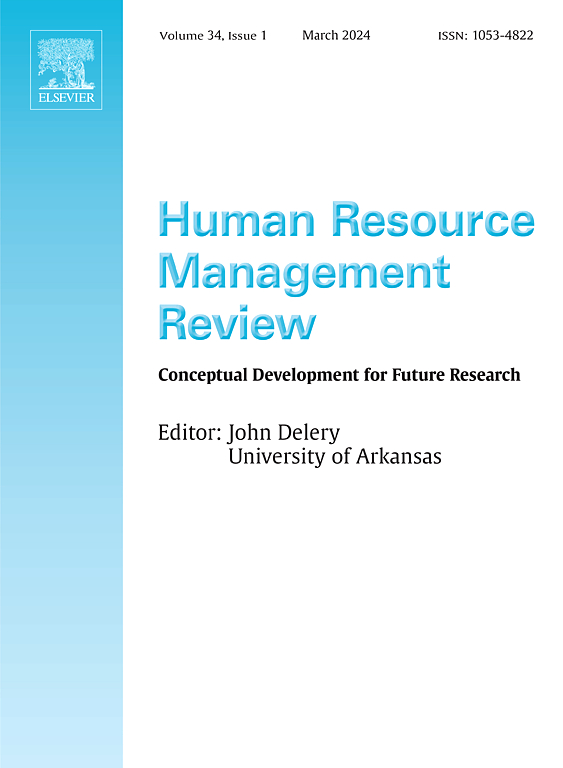How executive coaches actually coach: Leveraging a relational lens
IF 13
1区 管理学
Q1 MANAGEMENT
引用次数: 0
Abstract
Despite the widespread acceptance of executive coaching as a relational phenomenon, how these relationships play out in practice tends to be overlooked and under-researched. In this conceptual paper, we argue that the “caring, yet professionally distant” clinical approach to executive coaching is unrealistic. Challenging this approach, we propose a relational communication perspective on coach-client friendship development, which we situate within the larger relational triad of coaches, leader-clients, and organizational sponsors/decision-makers/superiors. Adopting micro and macro perspectives, we detail the forces that spark and sustain these friendships, including coaches' relational communication, the sincerity and instrumentality of coaches' relationship motives, and coaching's occupational characteristics. We consider the web of multiple relationships within which executive coaching occurs. Along the way, we discuss challenges to the practice of executive coaching as it relates to personal workplace relationships, and we discuss the ethical implications of these relationships. We conclude with provocative questions to guide future research and practice in both executive coaching and personal workplace relationship arenas.
高管教练实际上是如何指导的:利用关系视角
尽管人们普遍认为高管培训是一种关系现象,但这些关系在实践中是如何发挥作用的,往往被忽视,研究也不足。在这篇概念性论文中,我们认为“关怀,但专业疏远”的临床方法对高管培训是不现实的。为了挑战这种方法,我们提出了一种关系沟通的角度来看待教练-客户友谊的发展,我们将其置于教练、领导-客户、组织发起人/决策者/上级这三个更大的关系三元组中。我们从微观和宏观的角度,详细阐述了激发和维持这些友谊的力量,包括教练的关系沟通,教练的关系动机的诚意和工具性,以及教练的职业特征。我们考虑高管培训发生的多重关系网络。在此过程中,我们讨论了高管培训实践面临的挑战,因为它与个人职场关系有关,我们讨论了这些关系的伦理含义。最后,我们提出了一些具有启发性的问题,以指导未来在高管培训和个人职场关系领域的研究和实践。
本文章由计算机程序翻译,如有差异,请以英文原文为准。
求助全文
约1分钟内获得全文
求助全文
来源期刊

Human Resource Management Review
MANAGEMENT-
CiteScore
20.20
自引率
7.00%
发文量
0
审稿时长
48 days
期刊介绍:
The Human Resource Management Review (HRMR) is a quarterly academic journal dedicated to publishing scholarly conceptual and theoretical articles in the field of human resource management and related disciplines such as industrial/organizational psychology, human capital, labor relations, and organizational behavior. HRMR encourages manuscripts that address micro-, macro-, or multi-level phenomena concerning the function and processes of human resource management. The journal publishes articles that offer fresh insights to inspire future theory development and empirical research. Critical evaluations of existing concepts, theories, models, and frameworks are also encouraged, as well as quantitative meta-analytical reviews that contribute to conceptual and theoretical understanding.
Subject areas appropriate for HRMR include (but are not limited to) Strategic Human Resource Management, International Human Resource Management, the nature and role of the human resource function in organizations, any specific Human Resource function or activity (e.g., Job Analysis, Job Design, Workforce Planning, Recruitment, Selection and Placement, Performance and Talent Management, Reward Systems, Training, Development, Careers, Safety and Health, Diversity, Fairness, Discrimination, Employment Law, Employee Relations, Labor Relations, Workforce Metrics, HR Analytics, HRM and Technology, Social issues and HRM, Separation and Retention), topics that influence or are influenced by human resource management activities (e.g., Climate, Culture, Change, Leadership and Power, Groups and Teams, Employee Attitudes and Behavior, Individual, team, and/or Organizational Performance), and HRM Research Methods.
 求助内容:
求助内容: 应助结果提醒方式:
应助结果提醒方式:


